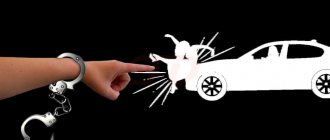Article 20 of the Criminal Code of the Russian Federation. Age at which criminal liability begins (current version)
1. A person who has reached the age of sixteen at the time of committing a crime is subject to criminal liability.
2. Persons who have reached the age of fourteen at the time of committing a crime are subject to criminal liability for murder (Article 105), intentional infliction of grievous bodily harm (Article 111), intentional infliction of moderate harm to health (Article 112), kidnapping (Article 126), rape (Article 131), sexual assault (Article 132), theft (Article 158), robbery (Article 161), robbery (Article 162), extortion (Article 163), unlawful taking of a car or other vehicle without the purpose of theft ( Article 166), intentional destruction or damage to property under aggravating circumstances (Part two of Article 167), terrorist act (Article 205), undergoing training for the purpose of carrying out terrorist activities (Article 205.3), participation in a terrorist community (Part two of Article 205.4), participation in the activities of a terrorist organization (Part two of Article 205.5), failure to report a crime (Article 205.6), hostage taking (Article 206), knowingly false report of an act of terrorism (Article 207), participation in an illegal armed group (Part two of Article 208), hijacking aircraft or water transport or railway rolling stock (Article 211), participation in mass riots (part two of Article 212), aggravated hooliganism (parts two and three of Article 213), vandalism (Article 214), illegal acquisition, transfer, sale , storage, transportation or carrying of explosives or explosive devices (Article 222.1), illegal production of explosives or explosive devices (Article 223.1), theft or extortion of weapons, ammunition, explosives and explosive devices (Article 226), theft or extortion of narcotic drugs or psychotropic substances (Article 229), disabling means of transport or means of communication (Article 267), encroachment on the life of a state or public figure (Article 277), attack on persons or institutions that enjoy international protection (Article 360), an act of international terrorism (Article 361).
3. If a minor has reached the age specified in parts one or two of this article, but due to mental retardation not associated with a mental disorder, during the commission of a socially dangerous act he could not fully understand the actual nature and social danger of his actions (inaction) or manage them, he is not subject to criminal liability.
Age. Age-related insanity
LECTURE 5
TOPIC: "SUBJECT OF A CRIME"
Concept, signs and meaning of the subject
Subject of the crime
is
an individual who
has committed a crime and is capable of bearing responsibility for it.
The subject of a crime is characterized by three mandatory
signs:
1) the subject of a crime can only be an individual
;
2) sanity
;
3) age of criminal responsibility
.
The subject of a crime who has additional
signs is called
special.
The characteristics of a special subject may be provided for in the articles of the Special Part of the Criminal Code (for example, Articles 106, 142, 275 of the Criminal Code) or follow from the meaning of the law (Article 131 of the Criminal Code).
Signs of a special subject are classified:
1) depending on the gender of the perpetrator
(Article 131 of the Criminal Code);
2) by citizenship of the person
(Articles 275, 276 of the Criminal Code);
3) depending on family relationships
(Articles 156, 157 of the Criminal Code);
4) according to official position
(Articles 169, 285, 286, 290 of the Criminal Code);
5) depending on professional status
(Article 124 of the Criminal Code);
6) in relation to military duty
(Articles 332, 338 of the Criminal Code);
7) for other reasons
(Article 142 of the Criminal Code).
Subject meaning
crimes:
1) being an element of the crime, it is included in the basis of criminal liability;
2) its signs help to correctly classify a crime.
Sanity. Insanity
Sanity
means that the person at the time of committing a socially dangerous act was capable of
realizing
the actual nature and social danger of his act (action or inaction) and could
direct
it
.
Insanity
(Part 1 of Article 21 of the Criminal Code) is characterized by
three criteria
:
1) medical
(biological) criterion includes:
a) chronic
mental disorder is
an incurable
mental illness (schizophrenia, epilepsy, manic-depressive psychosis);
b) temporary
a mental disorder is
a treatable
mental illness of varying duration (pathological intoxication, pathological affect).
A person who commits a crime in a state of physiological intoxication caused by the use of alcohol, drugs or other intoxicating substances is subject to criminal liability regardless of the degree of intoxication.
c) dementia
- These are mental disorders that impair intellectual functions. Dementia has three degrees - idiocy, imbecility, and debility.
d) other painful mental state
– these are conditions accompanied by mental disorders. For example, “Afghan or Chechen syndrome.”
The medical criterion is established on the basis of a comprehensive forensic psychological and psychiatric examination
.
2) legal criterion
consists of two elements:
a) intellectual element
means the impossibility of realizing the actual nature and social danger of one’s act;
b) volitional element
means the inability to control one’s action (inaction).
To establish a legal criterion, it is sufficient to establish the presence of one of these elements.
The legal criterion is established by the court
;
3) time criterion
means that medical and legal criteria exist at the time the crime was committed.
Criminal legal meaning of insanity
is that it excludes criminal liability. According to Part 2 of Art. 21 of the Criminal Code, a court may impose compulsory medical measures on a person declared insane.
A person who commits a crime in a state of physiological intoxication caused by the use of alcohol, drugs or other intoxicating substances is subject to criminal liability regardless of the degree of intoxication.
Age. Age-related insanity
In accordance with Art. 20 of the Criminal Code, a person’s criminal liability begins, as a general rule, when he reaches the age of sixteen
age.
According to Part 2 of Art. 20 of the Criminal Code from the age of fourteen
liability arises for a number of crimes.
The legislator identified these elements of crime, guided by the following grounds (reasons)
:
1) traditional nature of crimes;
2) a relatively high degree of public danger for a number of crimes;
3) prevalence among minors;
4) the ability to recognize the social danger of the act being committed.
For the commission of certain crimes, criminal liability begins not from the age of sixteen, but from a later age
, which is established directly in the articles of the Special Part of the Criminal Code (for example, Articles 134, 135, 150, 151 of the Criminal Code), or follows from the meaning of the law (for example, Articles 285, 286 of the Criminal Code).
A person is considered to have reached the age of criminal responsibility from zero hours following his birthday.
The age of a minor is determined on the basis of documents (birth certificate, passport).
If there is no data on the date of birth of a minor, then his age is established using a forensic medical examination.
There are two options
expert opinion:
1) the year of birth of the minor is indicated. In this case, the defendant’s birthday is considered to be the last day of the year, which is named by experts;
2) age is determined by the maximum and minimum number of years. In this case, the court proceeds from the minimum age of the minor.
According to Part 3 of Art. 20 of the Criminal Code, a minor is not subject to criminal liability if, although he has reached the age specified in the law, but due to mental retardation not associated with a mental disorder, during the commission of a crime he could not fully understand the actual nature and social danger of his actions (inaction). ) or manage them.
The discrepancy between the mental development of a minor and his actual age is called “age-related insanity.”
, which is characterized
by three criteria
:
1) medical
(psychological) criterion is characterized by the presence of a lag in mental development not associated with a mental disorder, that is, the mental development of a minor does not correspond to his actual age due to
infantilism
caused by social or pedagogical neglect;
2) legal
the criterion is characterized
by two elements
:
a) intellectual
an element that means that the minor could not fully understand the actual nature and social danger of his actions (inaction);
b) strong-willed
an element that means that the minor could not fully control his action (inaction). To have a legal criterion, either an intellectual or a volitional element is sufficient;
3) temporal
the criterion means that medical and legal criteria existed at the time of the commission of a socially dangerous act.
For the presence of “age-related insanity” it is necessary to establish the three specified elements in combination.
The meaning of "age-related insanity"
is that a minor is not subject to criminal liability.
LECTURE 5
TOPIC: "SUBJECT OF A CRIME"
Concept, signs and meaning of the subject
Subject of the crime
is
an individual who
has committed a crime and is capable of bearing responsibility for it.
The subject of a crime is characterized by three mandatory
signs:
1) the subject of a crime can only be an individual
;
2) sanity
;
3) age of criminal responsibility
.
The subject of a crime who has additional
signs is called
special.
The characteristics of a special subject may be provided for in the articles of the Special Part of the Criminal Code (for example, Articles 106, 142, 275 of the Criminal Code) or follow from the meaning of the law (Article 131 of the Criminal Code).
Signs of a special subject are classified:
1) depending on the gender of the perpetrator
(Article 131 of the Criminal Code);
2) by citizenship of the person
(Articles 275, 276 of the Criminal Code);
3) depending on family relationships
(Articles 156, 157 of the Criminal Code);
4) according to official position
(Articles 169, 285, 286, 290 of the Criminal Code);
5) depending on professional status
(Article 124 of the Criminal Code);
6) in relation to military duty
(Articles 332, 338 of the Criminal Code);
7) for other reasons
(Article 142 of the Criminal Code).
Subject meaning
crimes:
1) being an element of the crime, it is included in the basis of criminal liability;
2) its signs help to correctly classify a crime.
Sanity. Insanity
Sanity
means that the person at the time of committing a socially dangerous act was capable of
realizing
the actual nature and social danger of his act (action or inaction) and could
direct
it
.
Insanity
(Part 1 of Article 21 of the Criminal Code) is characterized by
three criteria
:
1) medical
(biological) criterion includes:
a) chronic
mental disorder is
an incurable
mental illness (schizophrenia, epilepsy, manic-depressive psychosis);
b) temporary
a mental disorder is
a treatable
mental illness of varying duration (pathological intoxication, pathological affect).
A person who commits a crime in a state of physiological intoxication caused by the use of alcohol, drugs or other intoxicating substances is subject to criminal liability regardless of the degree of intoxication.
c) dementia
- These are mental disorders that impair intellectual functions. Dementia has three degrees - idiocy, imbecility, and debility.
d) other painful mental state
– these are conditions accompanied by mental disorders. For example, “Afghan or Chechen syndrome.”
The medical criterion is established on the basis of a comprehensive forensic psychological and psychiatric examination
.
2) legal criterion
consists of two elements:
a) intellectual element
means the impossibility of realizing the actual nature and social danger of one’s act;
b) volitional element
means the inability to control one’s action (inaction).
To establish a legal criterion, it is sufficient to establish the presence of one of these elements.
The legal criterion is established by the court
;
3) time criterion
means that medical and legal criteria exist at the time the crime was committed.
Criminal legal meaning of insanity
is that it excludes criminal liability. According to Part 2 of Art. 21 of the Criminal Code, a court may impose compulsory medical measures on a person declared insane.
A person who commits a crime in a state of physiological intoxication caused by the use of alcohol, drugs or other intoxicating substances is subject to criminal liability regardless of the degree of intoxication.
Age. Age-related insanity
In accordance with Art. 20 of the Criminal Code, a person’s criminal liability begins, as a general rule, when he reaches the age of sixteen
age.
According to Part 2 of Art. 20 of the Criminal Code from the age of fourteen
liability arises for a number of crimes.
The legislator identified these elements of crime, guided by the following grounds (reasons)
:
1) traditional nature of crimes;
2) a relatively high degree of public danger for a number of crimes;
3) prevalence among minors;
4) the ability to recognize the social danger of the act being committed.
For the commission of certain crimes, criminal liability begins not from the age of sixteen, but from a later age
, which is established directly in the articles of the Special Part of the Criminal Code (for example, Articles 134, 135, 150, 151 of the Criminal Code), or follows from the meaning of the law (for example, Articles 285, 286 of the Criminal Code).
A person is considered to have reached the age of criminal responsibility from zero hours following his birthday.
The age of a minor is determined on the basis of documents (birth certificate, passport).
If there is no data on the date of birth of a minor, then his age is established using a forensic medical examination.
There are two options
expert opinion:
1) the year of birth of the minor is indicated. In this case, the defendant’s birthday is considered to be the last day of the year, which is named by experts;
2) age is determined by the maximum and minimum number of years. In this case, the court proceeds from the minimum age of the minor.
According to Part 3 of Art. 20 of the Criminal Code, a minor is not subject to criminal liability if, although he has reached the age specified in the law, but due to mental retardation not associated with a mental disorder, during the commission of a crime he could not fully understand the actual nature and social danger of his actions (inaction). ) or manage them.
The discrepancy between the mental development of a minor and his actual age is called “age-related insanity.”
, which is characterized
by three criteria
:
1) medical
(psychological) criterion is characterized by the presence of a lag in mental development not associated with a mental disorder, that is, the mental development of a minor does not correspond to his actual age due to
infantilism
caused by social or pedagogical neglect;
2) legal
the criterion is characterized
by two elements
:
a) intellectual
an element that means that the minor could not fully understand the actual nature and social danger of his actions (inaction);
b) strong-willed
an element that means that the minor could not fully control his action (inaction). To have a legal criterion, either an intellectual or a volitional element is sufficient;
3) temporal
the criterion means that medical and legal criteria existed at the time of the commission of a socially dangerous act.
For the presence of “age-related insanity” it is necessary to establish the three specified elements in combination.
The meaning of "age-related insanity"
is that a minor is not subject to criminal liability.




